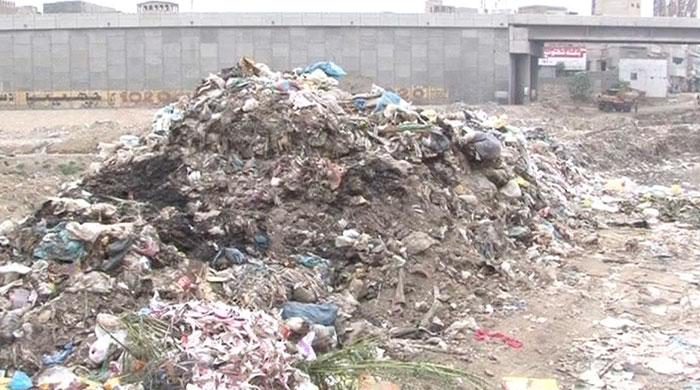CM Sindh gives three-day deadline to clean Karachi of garbage
Chief Minister Sindh Syed Qaim Ali Shah on Monday gave a three-day ultimatum to Commissioner Karachi Aijaz Ahmed Khan to clean the city from garbage, an issue that has hindered the beauty of the metropolis as well as caused health hazards to its citizens for decades.
The Sindh government has been under pressure for not tackling the situation that has been pointed by various sectors of society as well as health experts.
An earlier AFP report said rising air pollution is badly affecting the health of the people in Karachi and if urgent steps are not taken to reduce it, the citizen will face serious health hazards like cancer, lung, heart and respiratory diseases.
The report quoted SUPARCO officials as saying that the air in the atmosphere of Karachi, Pakistan’s largest city, and economic backbone, is rapidly polluted by vehicular smoke, industrial emissions, burning garbage, house fires, and other particles.
But government and environment organizations seems non-serious to tackle the issue timely, said the report.
According to details, CM Sindh on Monday warned the commissioner that if the city was not clean within the stipulated time, strict disciplinary action would be taken.
Experts are of the view that the human exposure to harmful air pollution generated by vehicles is contributing to diseases and reduction in life span of people.
Hazardous air pollutants, also known as toxic air pollutants or air toxics, are those pollutants that cause cancer or other serious health effects, such as reproductive effects or birth defects, or adverse environmental and ecological effects.
Most air toxics originate from human-made sources, including cars, trucks, buses and stationary sources like factories, refineries, power plants, as well as building materials and activities such as cleaning.
The News earlier reported Karachi produces 20,000 tons of solid waste every day but only 2,000 tons of it is actually transported to the landfill sites situated just outside the metropolis.
The rest of it is dumped and burnt inside the city, mostly in the two main drainage channels — Lyari and Malir rivers — from where the garbage is now spilling outside, besides other smaller drains and open dumps situated in and around residential areas.



